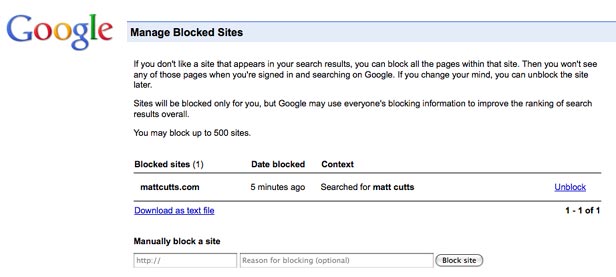There are 129,004 people using the Personal Bocklist Chrome extension from Google. This is the browser extension that the company launched on February 14, ahead of the Panda Update, which lets users simply block domains from ever appearing in their Google search results.
According to the extension page, it’s been getting 11,464 Weekly installs. For an extension that has only been around for just over a month, and available for a single browser, it’s interesting to think that this many people are using it, and blocking domains from their search results.
 I wonder how many of those who have installed the extension are actively blocking domains. When Google unleashed the Panda update shortly after it released the extension, the company said:
I wonder how many of those who have installed the extension are actively blocking domains. When Google unleashed the Panda update shortly after it released the extension, the company said:
It’s worth noting that this update does not rely on the feedback we’ve received from the Personal Blocklist Chrome extension, which we launched last week.
However, we did compare the Blocklist data we gathered with the sites identified by our algorithm, and we were very pleased that the preferences our users expressed by using the extension are well represented. If you take the top several dozen or so most-blocked domains from the Chrome extension, then this algorithmic change addresses 84% of them, which is strong independent confirmation of the user benefits.
Google was apparently so thrilled with the response to the Chrome extension, that they later announced that they were just incorporating similar functionality into the Google experience itself – no extension needed. This feature has not finished rolling out yet, but you have to wonder – if this many people have been taking advantage just through a Chrome extension, how much domain-blocking is going to go on once it’s just a click away for every Google user? Update: A Google spokesperson tells WebProNews: The feature is fully rolled out on google.com in English for people using Chrome 9+, IE8+ and Firefox 3.5+, and we’ll be expanding to new regions, languages and browsers soon.
If this isn’t a call for quality content, I don’t know what is. Tom Blue made an excellent point in the comments of our previous article on the feature:
This change is 5X more helpful than the Panda update. The Panda update is trying to make a judgement call on what people should see, this allows people to choose what they want to see. I believe they shouldn’t even use these results in future algos as it can be gamed and only certain people will use this feature.
Google did say it would consider making data from domain blocking a ranking signal down the line. Upon the release of the Chrome Extension, Matt Cutts said, ” If installed, the extension also sends blocked site information to Google, and we will study the resulting feedback and explore using it as a potential ranking signal for our search results.”
Then, when the feature was announced for Google results themselves (the Chrome-less version), Google said, “While we’re not currently using the domains people block as a signal in ranking, we’ll look at the data and see whether it would be useful as we continue to evaluate and improve our search results in the future.”
One has to wonder how Google would use such a signal in a way that could not be gamed by people getting their competitors’ sites blocked. There are other potential abuse scenarios as well. Personal spite comes to mind.
It’s possible that it could become a ranking signal and nobody will ever know for sure. Google will not reveal its entire list of signals. They may keep this one close to the chest, although that doesn’t mean it won’t still get abused based on hunches.
Keep in mind, you do have to visit a link before block option appears. Still, sites will do well to pay closer attention to the quality of the content they’re putting out than ever before. This really should benefit the web as a whole in the long run. Plus, quality content tends to get shared more anyway.
